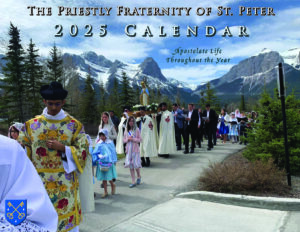Aim Rightly
We hear a lot about equity nowadays, and that is why we are really bothered by “double-standards.”
After all, why should one person or group be governed by one set of rules and another by a different set? Or why do those who seem tasked with implementing equity, be it in the political, social, or financial realms, feel the need to make personal exceptions for themselves?
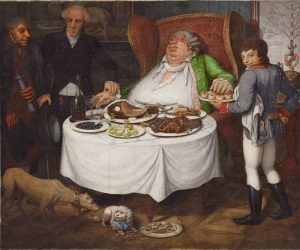 Why are large fuel-consuming jets taken to environmental summits, or fine food served at conferences about how to feed the hungry? This sounds hardly equitable.
Why are large fuel-consuming jets taken to environmental summits, or fine food served at conferences about how to feed the hungry? This sounds hardly equitable.
As we all experienced draconian measures in response to the coronavirus that have invaded and upset the flow of daily life – measures carrying catastrophic social consequences that still stand in need of computation – perhaps many have also experienced rightful indignation over various government officials ignoring the very measures imposed upon their constituents.
But in a way that became small peanuts when compared to the blowback that began occurring when the measures started to go questioned. Something was rotten in Denmark, as the saying goes. So as things progressed and the scrutiny intensified, especially as stories and information kept changing from those in charge, an irony emerged: the same people who treat religion with contempt, who belittle those of Faith as ignoramuses and blind followers of authority, suddenly started demanding it from the masses. It was kind of fun to be like a god.
Science was invoked as an infallible authority (interesting how the viability of the unborn still goes ignored); dogmas were established, and new commandments were drawn up, complete with what constituted virtuous behavior. The expectation was for everyone to obey. Those who raised concerns became the new heretics for this emerging new religion that insisted on some form of blind faith.
But one irony tends to breed another.
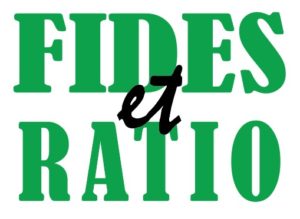 For what is being demanded is not “faith,” and the Church would be the first to point that out. Never has the Church separated right reason from the virtue of faith.
For what is being demanded is not “faith,” and the Church would be the first to point that out. Never has the Church separated right reason from the virtue of faith.
In fact, her entire patristic and scholastic Tradition reveals the Church inviting the use of reason and critical thinking – the asking of questions – for the understanding of what she proposes for belief. The entire method of St. Thomas Aquinas, for instance, is a forum of questions, objections, answers, and resolutions.
True, grace is needed to ultimately make an act of faith, but even that is not against right reason. An act of faith simply admits where reason has limits, but such would not include an assent to contradictions. God expects us to humbly use the minds He gave us to arrive at the truth He desires us to know for the salvation of our souls. He is the Light that enlightens every man who comes into the world so that we can reasonably discern the credentials and credibility of Christianity.
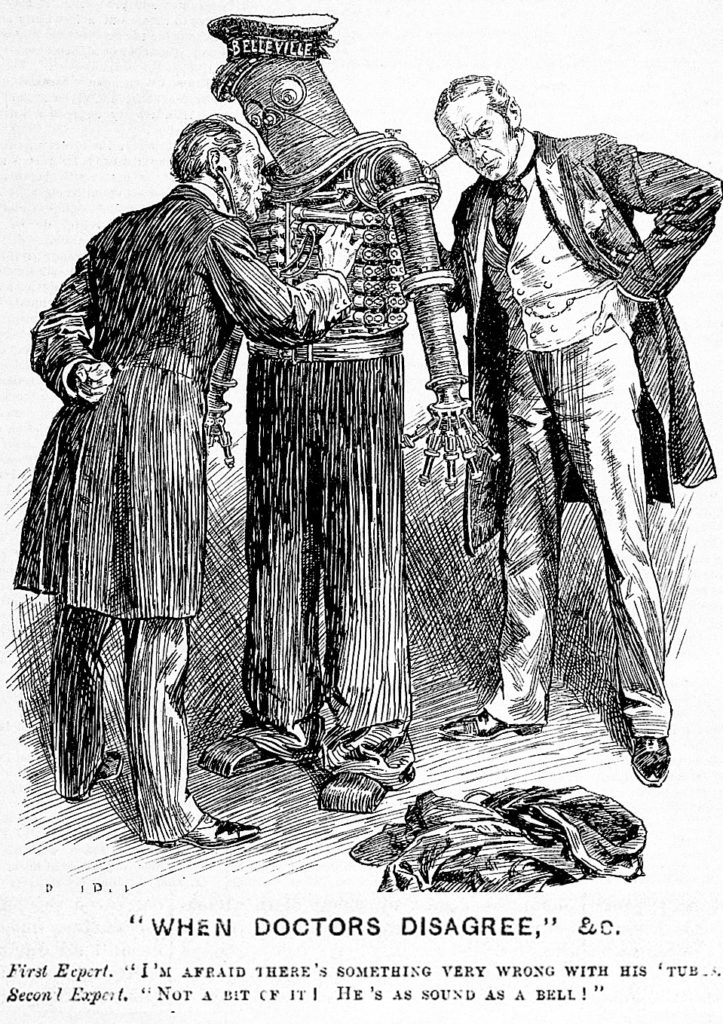 This is why a recent paper published by Massachusetts Institute of Technology (MIT) researchers merits comment here. The paper is quite critical of those who question the measures imposed in response to the coronavirus, not because of their failure to cite science in their objections, but – and here is the double-standard – because of their use of the same science and data to draw different conclusions. How dare this happen! It is almost reminiscent of the man born blind who challenges the Pharisees when he grew tired of their constant banter over who cured him: Thou was born wholly in sins and dost thou teach us? (Jn. 9:34)
This is why a recent paper published by Massachusetts Institute of Technology (MIT) researchers merits comment here. The paper is quite critical of those who question the measures imposed in response to the coronavirus, not because of their failure to cite science in their objections, but – and here is the double-standard – because of their use of the same science and data to draw different conclusions. How dare this happen! It is almost reminiscent of the man born blind who challenges the Pharisees when he grew tired of their constant banter over who cured him: Thou was born wholly in sins and dost thou teach us? (Jn. 9:34)
The most embarrassing part is that the paper even admits that the criticism of such measures is actually grounded in “more scientific rigor, not less.” Since the outcome is different, however, and perhaps since it exposes a propagandist agenda, like those Pharisees who expelled the cured blind man from the Temple for confessing Christ, the paper accuses those critical of the measures of employing “weaponized critical thinking.”
Perhaps this marks the latest version of domestic terrorism. How opposite the methods of Holy Mother Church, who accepts scrutiny because it makes the Truth of the Gospel shine more brilliantly. How contrary to the Church’s insistence on freedom and the use of critical thinking to arrive at these saving truths of holy religion.
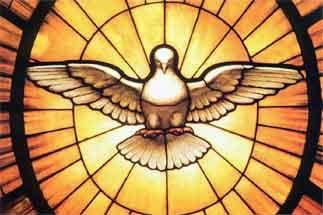 How different the work of the Holy Spirit who patiently enlightens the soul to understand the dogmas proposed by the Church so as to judge rightly about them and live accordingly.
How different the work of the Holy Spirit who patiently enlightens the soul to understand the dogmas proposed by the Church so as to judge rightly about them and live accordingly.
At the end of the day, there is no matter more critical, and that requires the discipline of critical thinking, than salvation and where we spend eternity. Pentecost is all about that.
Perhaps those who demand blind faith in their new religion while criticizing the Spirit’s methods over what true Faith is really about should consider whether they have weaponized their critical thinking into some act of spiritual suicide. How they miss the equity and freedom that comes with belief in the True Faith.
Veni Sancte Spiritus!
May 21, 2021

FSSP Nigeria Property Tour, March 2021
Father Van der Putten from our FSSP Mission Tradition apostolate in Nigeria sent along a quick tour of the mission farm. Tropical agriculture is in full swing again this year!
The fields are being cleared and readied to grow corn and yams. Tropical permaculture crops such as papaya, banana trees, sugar cane, avocado, and guava surround the area.
Watch closely to see the tractors, generators, a truck and livestock that benefactors (like you) helped to provide!
May 19, 2021

Gatehouse Blessing: Regina Caeli in Houston
by Fr. William Rock, FSSP.
There were tornado and hail warnings, and it had rained heavily. But that was all the day before. By 10:00 am on Saturday, April 24, 2021, the ground around the outdoor St. Michael’s Shine was dry enough so that Mass could be said there without the faithful having to worry about mud.
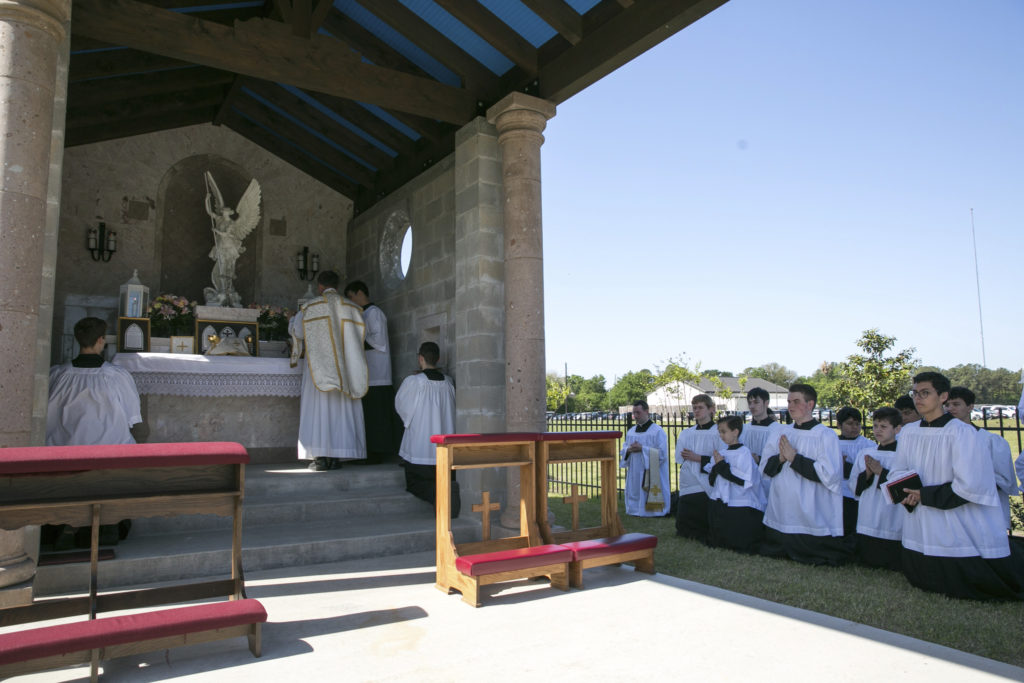
The occasion for this outdoor Mass was the blessing of the newly constructed Gate House of Regina Caeli (Queen of Heaven) Parish in Houston, Texas. Once completed and occupied, this Gate House will serve as the rectory and office for this growing Fraternity apostolate. It will also boast of general-purpose rooms and a kitchen.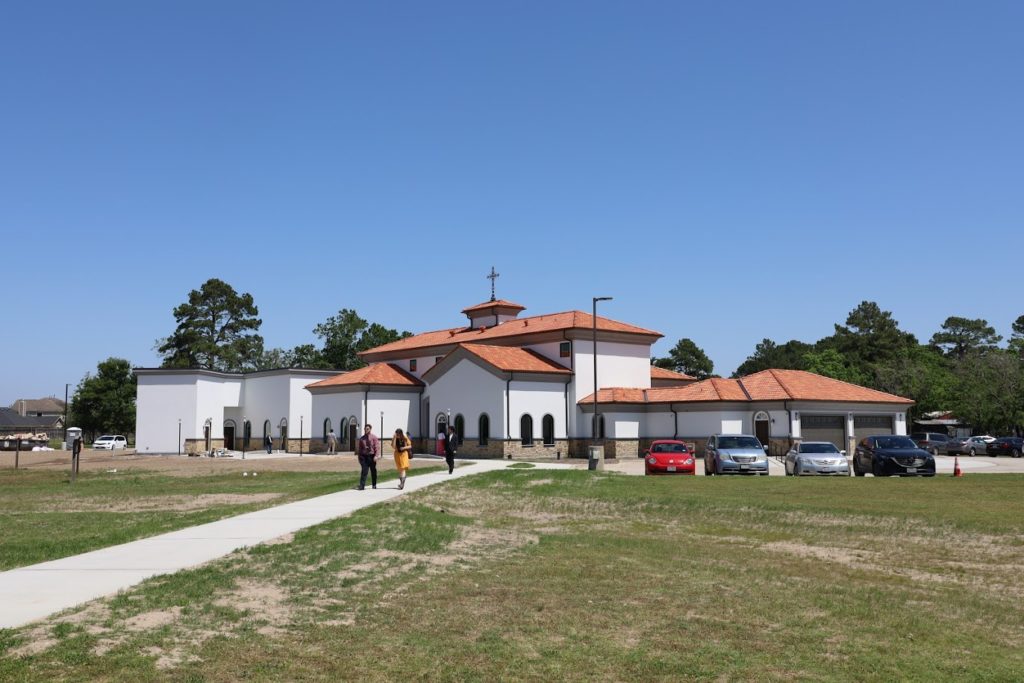
Fr. Charles Van Vliet, the founding and current pastor of Regina Caeli Parish, celebrated this Mass in thanksgiving for the near completion of the Gate House. The text of the Mass was that of the Queenship of Mary (May 31) with the additional orations for a Mass of Thanksgiving and St. Fidelis of Sigmaringen whose feast it was. During his homily, Fr. Van Vliet explained that the Gate House was named after Blessed Solanus Casey († A.D. 1957) of the Order of Friars Minor (Franciscans) Capuchin.
Because of the difficulties he had with his studies, when he was ordained to the Priesthood, Fr. Casey was designated as a simplex Priest. This meant that he was not given faculties to preach or hear Confessions. Because of these restrictions, Fr. Casey was assigned as the Porter of a monastery of his Order in Detroit, Michigan. In this role, he would greet those who were visiting the monastery. As time passed, he became renowned for the spiritual guidance he gave to those he interacted with during the fulfillment of his duties.
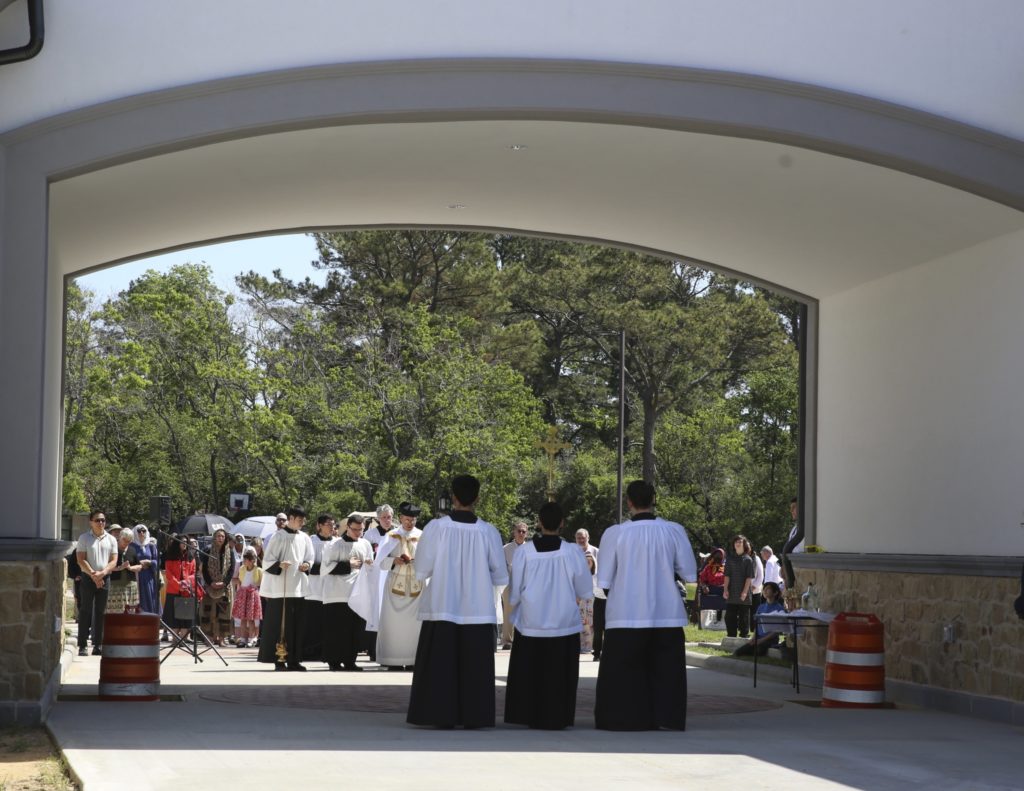
The choice of naming the Gate House after Blessed Solanus Casey is a fitting one. As Blessed Solanus Casey was the friar who would welcome those to the monastery, so will the Blessed Solanus Casey Gate House welcome the faithful into the campus of the Regina Caeli Parish; for once all of the constructions on the grounds are completed, the Gate House with its massive gate (not yet constructed or installed) will serve as the entrance to a complex with a church, a day chapel, St. Athanasius Hall (currently serving as a chapel), a school, and other possible buildings as well. The Gate House itself, and indeed the entire the complex, are inspired by the Spanish Missions in Texas.
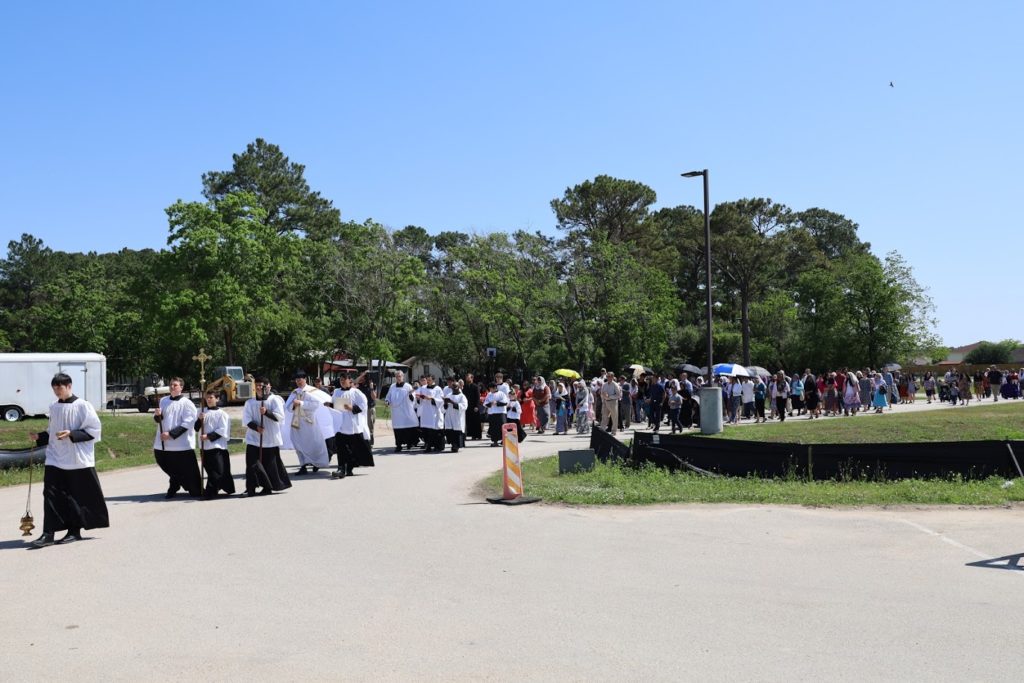
At the conclusion of the Mass, Fr. Van Vliet changed into a cope and a procession made its way from the St. Michael’s Shrine to the Gate House chanting the Litany of the Saints along with its versicles, responses, and prayers. Once those were completed, Fr. Van Vliet intoned the Vidi Aquam for the blessing of houses/buildings during Paschaltide.
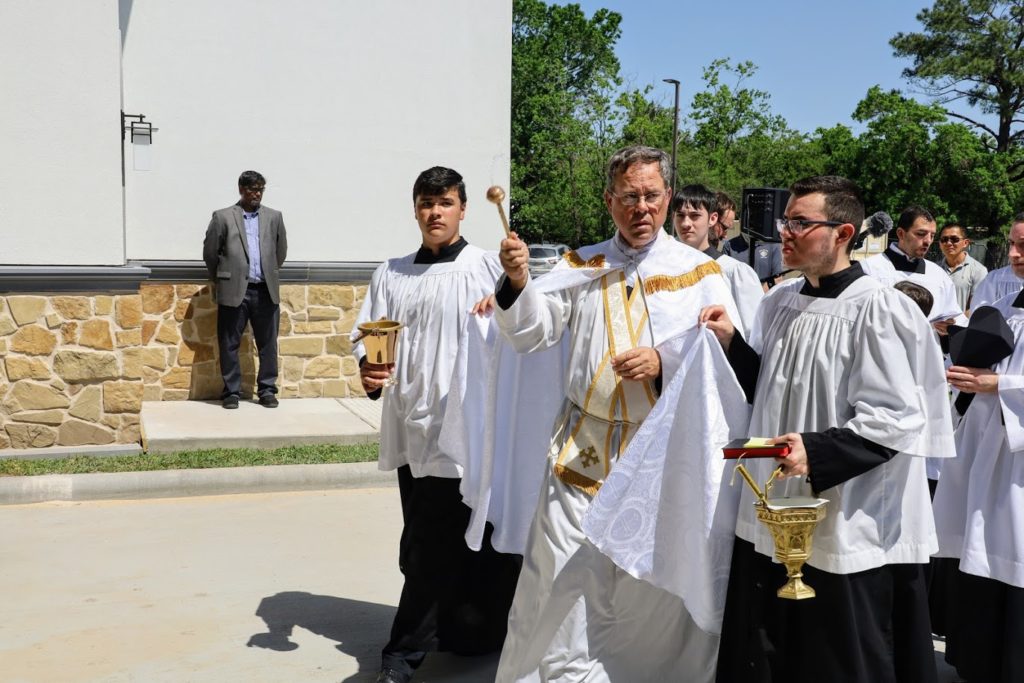
The schola continued the chant and verses of Psalm 117 as Father and several of the servers went through the building sprinkling Holy Water and filling the space with incense.
Antiphon. I saw water coming forth the temple on the right side, alleluia; and all those to whom this water came were saved, and shall say, alleluia, alleluia. (Ps. 117.) The Antiphon is repeated.℣. Show us, O Lord, Your mercy, alleluia.
℟. And grant us Your salvation, alleluia.
℣. O Lord, hear my prayer.
℟. And let my cry come to You.
℣. The Lord be with you.
℟. And with your spirit.
Let us pray.
Hear us, Lord, holy Father, almighty everlasting God. As at the time of the exodus from Egypt, You protected the homes of the Hebrews from the punishing angel when their doors were marked with the blood of the lamb which prefigured our Pasch in which Christ was immolated, so send Your holy angel from heaven to guard, foster, protect, visit, and defend all who live in this dwelling place. Through the same Christ our Lord.
℟. Amen.
Once he and the servers returned, Father completed the blessing and then added the following, the Capital Campaign Prayer:
Antiphon: Behold, I stand at the gate and knock. If any man shall hear my voice, and open to me the door, I will come into him, and will sup with him, and he with me.
℣. Lift up your gates, O ye princes, and be ye lifted up, O eternal gates.
℟. And the King of Glory shall enter in.
Let us pray.
O Lord Jesus Christ, who bears the key of David, so that none may shut when you open and none open when you shut, hear the devout prayers of your people who undertake the building of the Blessed Solanus Casey Gatehouse, and grant that we may begin our work under your inspiration, develop it by your grace, and complete it for your glory, who lives and reigns world without end. Amen.
Our Lady, Queen of Heaven, pray for us.
Saint Athanasius, pray for us.
Blessed Solanus Casey, pray for us.
The Pastor concluded the ceremony by giving a brief history of the progress of the Gate House, how it had been impacted by COVID, disruptions in the supply chains, and weather-related events (including a hurricane and the big freeze near the start of this year’s Lent).
The groundbreaking was held on Sunday, January 26, 2020. Shortly thereafter, on April 20, 2020, the construction contract was signed and, following the preparation of the site, construction began in May 2020. Fr. Van Vliet also thanked the faithful for their generosity both financial – the ~$2.5 million program has been fully funded by gifts and pledges through a Capital Campaign which was launched on June 10, 2018 – and for the hours spent by volunteers helping with work. Before departing to the Sacristy, Fr. Van Vliet bestowed his blessing on those gathered.
The festivities of the day closed with an indoor/outdoor buffet while members of the Parish’s Knights of Columbus council served as minders for those touring the Gate House. The weather, thankfully, was practically perfect for the approximately 170 faithful who attended.
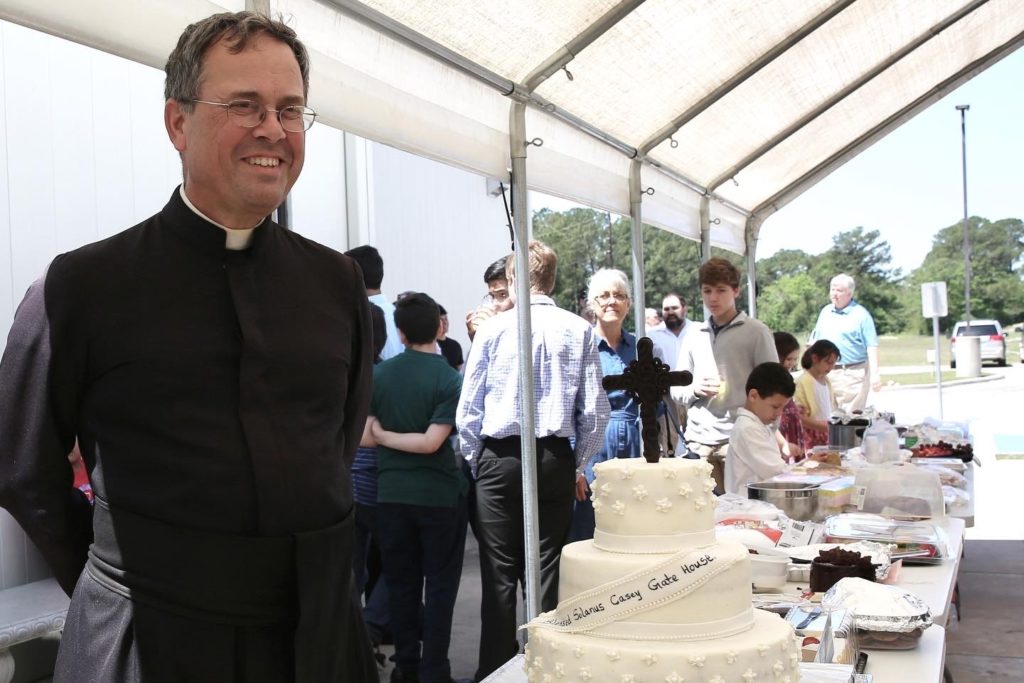
Our Lady, Queen of Heaven, pray for us!
Saint Athanasius, pray for us!
Blessed Solanus Casey, pray for us!
For more information about the parish and to see detailed plans of the anticipated buildings, please visit www.reginacaeliparish.org.
Fr. William Rock, FSSP was ordained in the fall of 2019 and is currently in residence at Regina Caeli Parish in Houston, TX. Photos were provided by volunteers of Regina Caeli Parish.
May 17, 2021

FSSP Pennsylvania Soccer Tournament
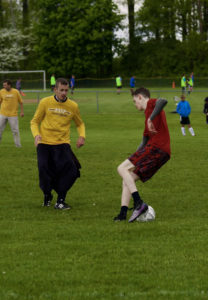
On the cool and overcast afternoon of May 8th, 2021, priests and parishioners from three parishes clashed in Allentown, Pennsylvania for the first-ever PA FSSP Cup.

The tournament began as an intra-parish rivalry between two teams at St. Stephen’s in Allentown, and just this year expanded to the nearby parishes of St. Michael’s of Scranton and Mater Dei of Harrisburg.
Fathers Pendergraft, Harkins, Alloy and Killackey all took to the field with their respective parish teams and in their full traditional cassocks.
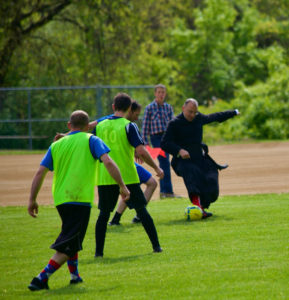
“This soccer tournament was a great way to bring the parishioners of many nearby FSSP apostolates together for some competitive soccer and fellowship. ” said Fr. Killackey of Mater Dei.
“We are grateful to the priests and parishioners of St. Stephen’s for their work in organizing this event…and we look forward to snatching the trophy from them in future tournaments.”
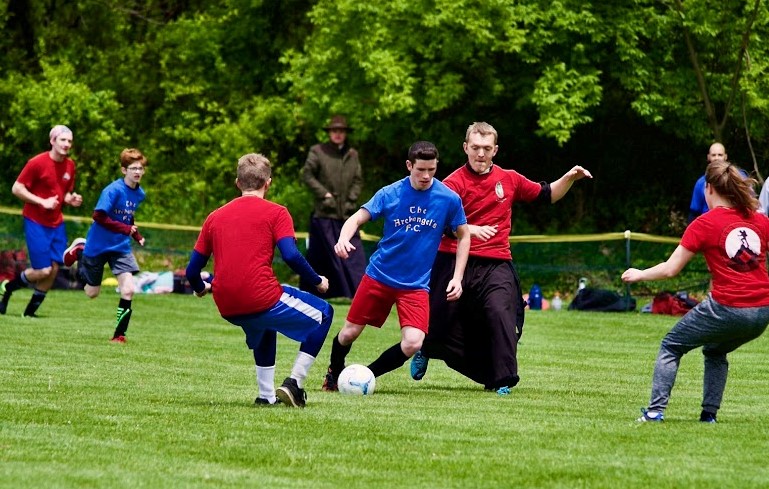
The tournament concluded with the priests leading the players in the Salve Regina.

1st Place: Fr. Alloy’s Gunners (St. Stephen of Hungary, Allentown)

2nd Place: Fr. Killackey’s Mater Dei team (Mater Dei, Harrisburg)
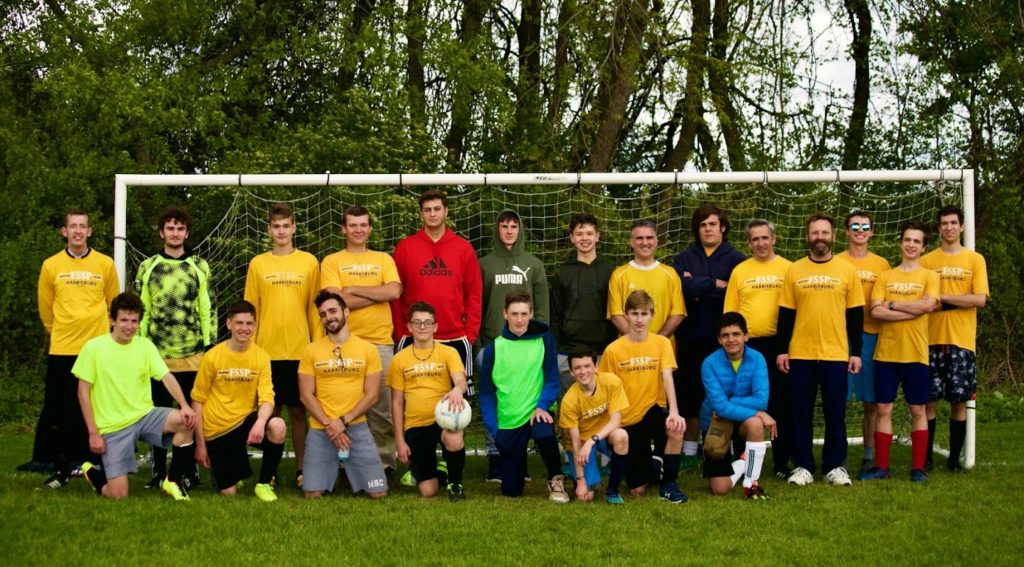
3rd Place: Fr. Pendergraft’s United FC (St. Stephen of Hungary, Allentown)

Fr. Harkins’ The Archangel’s FC (St. Michael the Archangel, Scranton)

Photos by A. Veronica Frisch.
May 14, 2021

Dom Gueranger on Rogations and Wrath
Remarked the priest who sent this to us: “You would think this was written today.” Read the full piece on Rogation Days by Dom Gueranger on the website of FSSP Atlanta. -ed.
“Let us think, for a moment, of the countless sins that are being committed, day and night; and let us sue for mercy.
In the days of Noe, all flesh had corrupted its way; but men thought not of asking for mercy. The flood came, and destroyed them all, says our Saviour. Had they prayed, had they begged God’s pardon, the hand of His justice would have been stayed, and the flood-gates of heaven would not have been opened.
The day is to come, when not water as heretofore, but fire, is suddenly to be enkindled by the divine wrath, and is to burn the whole earth. It shall burn even the foundations of the mountains; it shall devour sinners, who will be resting then, as they were in the days of Noe, in a false security.
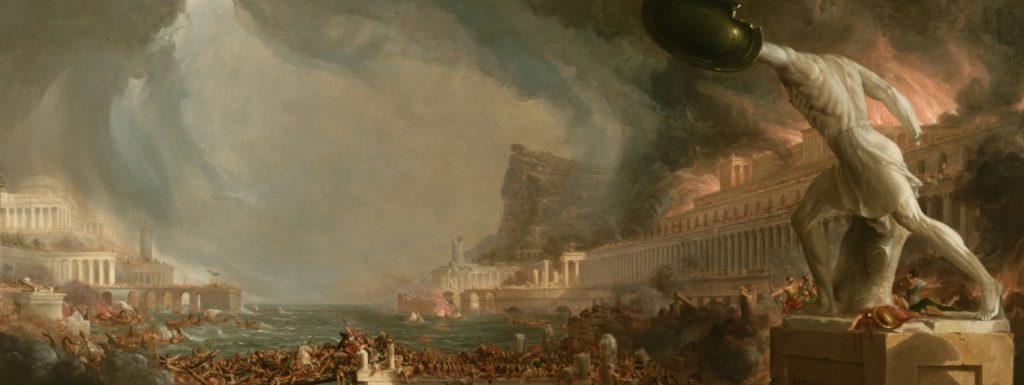
Persecuted by her enemies, decimated by the martyrdom of her children, afflicted by numerous apostasies from the faith, and deprived of every human aid, the Church will know that the terrible chastisement is at hand, for prayer will then be as rare as faith.
Let us, therefore, pray; that thus the day of wrath may be put off, the Christian life regain something of its ancient vigour, and the end of the world not be in our times. There are even yet Catholics in every part of the world; but their number has visibly decreased.
Heresy is now in possession of whole countries, that were once faithful to the Church. In others, where heresy has not triumphed, religious indifference has left the majority of men with nothing of Catholicity but the name, seeing that they neglect even their most essential obligations without remorse.
Among many of those who fulfil the precepts of the Church, truths are diminished. The old honesty of faith has been superseded by loose ideas and half-formed convictions. A man is popular in proportion to the concessions he makes in favour of principles condemned by the Church.
The sentiments and actions of the saints, the conduct and teaching of the Church, are taxed with exaggeration, and decried as being unsuited to the period. The search after comforts has become a serious study; the thirst for earthly goods is a noble passion; independence is an idol to which everything must be sacrificed; submission is a humiliation which must be got rid of, or, where that cannot be, it must not be publicly acknowledged.
Finally, there is sensualism, which, like an impure atmosphere, so impregnates every class of society, that one would suppose there was a league formed to abolish the cross of Christ from the minds of men.
What miseries must not follow from this systematic setting aside of the conditions imposed by God upon His creatures?
If the Gospel be the word of infinite Truth, how can men oppose it without drawing down upon themselves the severest chastisements? Would that these chastisements might work the salvation of them that have provoked them!
Let us humble ourselves before the sovereign holiness of our God, and confess our guilt.
The sins of men are increasing both in number and in enormity. The picture we have just drawn is sad enough; what would it have been, had we added such abominations as these, which we purposely excluded: downright impiety; corrupt doctrines, which are being actively propagated throughout the world; dealings with satan, which threaten to degrade our age to the level of pagan times; the conspiracy organized against order, justice, and religion, by secret societies?
Oh! let us unite our prayer with that of holy Church, and say to our God: From Thy wraths deliver us, O Lord!”
-Dom Gueranger, The Liturgical Year (1909).
May 12, 2021

Maternity Leave
It tends to be amusing to watch young boys and girls engage in a battle of wits at times over which of the two and only two sexes is better, ranging from sports, to schoolwork, to music, to just about anything.
 A story of a grade school boy comes to mind who once proudly told a girl classmate how she could never become a priest, only for her to quickly retort that he could never become a mother. That pretty much ended the conversation. After all, how could the boy really get an upper-hand on that one? Would he have argued that priests are better than mothers, or that priests don’t need mothers, or that priests don’t have mothers? After all, it was important enough for Our Lord, the High Priest, to have one.
A story of a grade school boy comes to mind who once proudly told a girl classmate how she could never become a priest, only for her to quickly retort that he could never become a mother. That pretty much ended the conversation. After all, how could the boy really get an upper-hand on that one? Would he have argued that priests are better than mothers, or that priests don’t need mothers, or that priests don’t have mothers? After all, it was important enough for Our Lord, the High Priest, to have one.
With Mothers’ Day this past Sunday, and with May Crownings taking place throughout this month of Mary, some words are in order about the noble state of motherhood.
 For many, the image of a mother tends to be an image of selflessness. Even the most rough-and-tumble of people almost always have a soft spot in their hearts for their mothers; the stereotypical tattoo of a heart with the word “MOM” in it, even at the most primal level, is an emblem of and tribute to the sacrifice and self-giving, of love without counting the cost, of forgiveness without question, even despite a mother’s personal faults.
For many, the image of a mother tends to be an image of selflessness. Even the most rough-and-tumble of people almost always have a soft spot in their hearts for their mothers; the stereotypical tattoo of a heart with the word “MOM” in it, even at the most primal level, is an emblem of and tribute to the sacrifice and self-giving, of love without counting the cost, of forgiveness without question, even despite a mother’s personal faults.
Those in prison for actual crimes often lament letting their mothers down because, for some, their mothers are the only experience of unconditional love they have, and the sense of disappointing someone like that is hard to bear.
Once a woman has a baby, no man of worth could ever look at his wife without regarding her now as the mother of his children. Things are different, for in seeing his wife bear the pains of birth, how much more should it inspire him to protect and care for her as he would his own life, because are not the children an extension of his own life? After all, they bear his name and he is commanded to love his wife as Christ loved the Church (cf. Eph. 5:25). And even if a couple is not blessed with children, how can a man not be deeply moved when he sees the motherly instinct show forth in his wife when she takes care of others who are not her own?
 Simply put, motherhood is heroic by nature, and the heroic appeals to every man and inspires him to rise to it as well.
Simply put, motherhood is heroic by nature, and the heroic appeals to every man and inspires him to rise to it as well.
But why is this appeal to the heroic so pronounced in motherhood? It has something to do with how God has equipped a woman for it, leaving nothing in her unaffected – biologically, psychologically, emotionally, spiritually. It is woven into the nature of woman to communicate life, to protect life, and to continue to promote the welfare of that life.
This is most necessary considering what God does when He makes a woman a mother: for when a woman conceives, the new life within is the work of God, she is the essential partner through whom two fathers work, a human and a Heavenly. In a sense, the woman’s body becomes the temple within which God creates new souls that will live forever, souls made to know, love, and serve Him. Assuming the responsibilities for this is where the sacrificial component of motherhood really comes into play and where a mother must strive to find her fulfillment.
To quote Ven. Fulton Sheen:
In a mother, two of the great spiritual laws are united into one: love of neighbor and cooperation with God’s grace – and both are applied in a unique way. For love of neighbor, to anyone except a mother, is a love of a non-self; a mother’s neighbor during pregnancy is one with herself, yet to be loved differently than the self. The sacrifice involved in neighborly love now takes place within her flesh; the agent and the object of her sacrifice are both contained within her. […] This is why women have a surer understanding of the doctrine of redemption than men have: they have come to associate the risk of death with life in childbirth, and to understand the sacrifice of self to another through the many months preceding it.
When motherhood is understood like this, it is evident why a woman would respond as she does in generously accepting the children God sends and laboring tirelessly for their welfare: in carrying her children and giving birth to them, or by adopting them as her own, she should receive a greater veneration for the Source of her own life. Collaborating with God, she brings God to man in the creation of a new life, and she brings man to God by giving birth to that new life. It certainly sounds priestly in some analogous way.
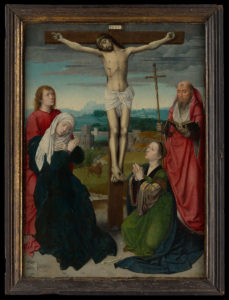 So when Sacred Scripture depicts Motherhood par excellence standing at the foot of the Cross, every aspiring mother must find her find inspiration there.
So when Sacred Scripture depicts Motherhood par excellence standing at the foot of the Cross, every aspiring mother must find her find inspiration there.
Indeed it is a formidable tide for women to swim against nowadays, but it can and must be done – how many souls could be counting on it, and how many women who are wandering are in need for that example? We all know how modern society tries to destroy motherhood: immodesty, promiscuity, trashy romance on the screen, contraception in and out of marriage, cohabitation, abortion, unnatural behavior – all of this is anti-mother, and is at the core of both moderate and radical feminism which seeks to destroy women by “freeing” them from the inclination to motherhood and life that their God-given femininity draws them.
The Blessed Virgin is hated by hell because she is a Mother, and because hell is well-aware of the exalted place God has given motherhood in the redemption of humanity as a whole, and the place He continues to give motherhood in the redemption of each one of us.
After all, is it not from our mothers, long before we understood words, that we learn of God and His love for us? Is not motherhood in its own way a real continuation of Calvary from where we all receive the life of grace? Is not our Lady’s own vigil at the foot of the Cross the prototype of every mother’s vigil, whether it be at the bedside of a sick child or in her constant prayers for her wandering children?
How fitting then for our Lord to bequeath His own Mother to us from the Cross: Woman, behold thy son (Jn. 19:26).
This is why we crown and confess our devotion to Mary throughout her month, for she inspires the heroic within us all when it comes to doing God’s work, which is exactly what dedicated family life is.

But the heroic is not difficult all the time. Such would be unsustainable. Amidst trials, our Lady enjoyed the quiet of Nazareth in the company of Jesus and St. Joseph.
And God grants those quieter moments to all. Perhaps a father should find one in seeing his wife cuddling their children. A mother should find one in that loving word or gesture of support from her husband.
And all of us should find one and smile when we see a mother tending to her child – because that is exactly when God does.
May 10, 2021

Requiem for the Wrong Repetition
We know the old adage that repetition is the mother of learning.
While this certainly applies to times tables and catechism, among many other things, there are things that should not need to be repeated unless there is a motive behind it. Such a case would be when a boss or parent constantly needs to inform everyone either by word or mannerism that he is in charge; insecurity and sense of loss of control are usually at the bottom of that.
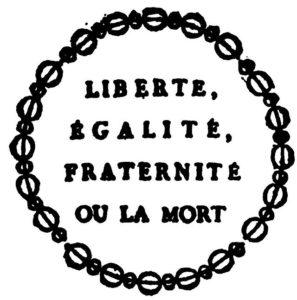
Another instance would be when certain words or phrases are frequently used, but within changing or fluid contexts, words like freedom, or equality, or privilege, or diversity. In these cases, the motive seems to be more about changing the definition of the word in order to fit an agenda. While there can be a common (albeit somewhat incomplete) understanding of what the words mean, words like these are employed to play upon people’s sympathies and then used against them.
Ask the average good-willed person on the street, for instance, as to whether or not he is for equality, and we would expect him to say “yes”; he would naturally say that everyone is equal in dignity as a human being, and that we should have equal opportunities to improve ourselves. Such an answer, though, would implicitly admit that not everything is equal, nor actually can be, which is in harmony with reality.
This is precisely where the hook gets set by those with an agenda, for the ideology of revolutions is fed by a vocabulary of familiar words which once meant something else. These become the bludgeons of a “cancel culture” eager to put them in the hands of Kool-Aid intoxicated youth who poorly substitute stringing ideological placards together for critical thinking. While common sense may still circulate among a silent majority, one can only wonder how long before that becomes a rare commodity.
An interesting article on this subject by Fr. John Perricone recently appeared in Crisis Magazine titled The Tightening Noose of Diversity Ideology. He neatly describes how things have gone the way they have:
America has become a willing hostage to a new despotism: diversity parading as equality. It strangles society because it not only erases equality but undermines true diversity. Equality assumes that each member of society is allowed to rise to the level of their own excellence, a potential deeply knit into man made in imago et similitudo Dei. Diversity is the blessed result, a multi-textured loveliness which results when equality moves as it should. Let a polity surrender equality for cruel facsimiles, then despotism reigns, excellence dies, diversity is discarded, and unity crumbles under the jackboot of injustice.
 Most of us experience first-hand the absurd level this has reached, since almost every major name-brand now tows the “diversity” agenda in some way. Fr. Perricone cites the recent Nasdaq initiative. So instead of just pictures of Paris or Hawaii in the waiting area, we now have unnatural posters thrown into the mix as we board a plane. A soda can’s color scheme has changed to reflect being in sync with the diverse.
Most of us experience first-hand the absurd level this has reached, since almost every major name-brand now tows the “diversity” agenda in some way. Fr. Perricone cites the recent Nasdaq initiative. So instead of just pictures of Paris or Hawaii in the waiting area, we now have unnatural posters thrown into the mix as we board a plane. A soda can’s color scheme has changed to reflect being in sync with the diverse.
Long gone are those days when all we expected Calgon to do was clean your clothes and “take you away,” wherever that was. Sounds so simple because it really should be.
The analogy of the “tightening noose” not only reflects the frantic speed at which this is all happening now, but the choke hold that seeks the death of human nature and right reason. Responding to this from a natural standpoint carries its own importance, as insisting on the proper definitions of words is critical. This is what Jordan Peterson and others bring to the table, for instance. But while there is plenty to talk about, it is insufficient overall; as mentioned in a previous post, Peterson seems to be running into the limits of it as he struggles with the God and religion question, although the brilliant horizons of the everlasting hills await him upon an act of supernatural faith.
A genuine and honest search for meaning and personal betterment – that is, excellence – eventually has to go there.
This is where the Catholic plays a most important part, because we are in possession of the answer. But after decades of Catholics being accustomed to keep silent about their beliefs, no doubt following the example of their shepherds, the tactic of going along to get along has proved its disastrous consequences.
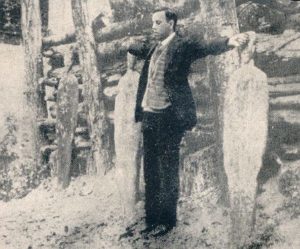 Catholics must come to terms that the masterminds behind the new “diversity” never included Catholicism as part of the final product. The Truth that will set us free is being forcibly replaced with the lie that will hold us in tyranny. Satan wishes to be worshipped as if he were God, and to implement his own version of diversity upon the humanity he hates. Hence the normalization of all things foul, with the intent that the Catholic submits and accepts.
Catholics must come to terms that the masterminds behind the new “diversity” never included Catholicism as part of the final product. The Truth that will set us free is being forcibly replaced with the lie that will hold us in tyranny. Satan wishes to be worshipped as if he were God, and to implement his own version of diversity upon the humanity he hates. Hence the normalization of all things foul, with the intent that the Catholic submits and accepts.
No. In Fr. Perricone’s words:
Woke diversity is like the creeping overgrowth of a jungle, and the jungle is Hobbes’ “war of all against all.” Decent men must see how it threatens Judeo-Christian civilization as we have known it, to say nothing of our beloved Republic. Tarrying in confronting it is simply not an option.
Only two options remain when pressed into a corner: be crushed, or fight our way forward, and this is where we are. However, if we are on the back foot, then we work to shift the weight and use it as a spring to haul us forward, beginning with those around us, gaining courage from mutual support. God does not command success, but He does command that we try.
Know what the Church teaches, but then have a reason for your faith that is more than a product of rote repetition and memorization. Do not worry if you do not have all the answers; no one does, but at least have some that can pose a challenge to those drowning in the swamp of false diversity.
Because the Catholic does not care about those externals and superficial traits which the “new diversity” emphasizes and exploits. Rather the Catholic looks past all that and regards another as a soul known and loved by God, standing in desperate need of life from Him.
After all, when all is said and done, the only repetition worth hearing is the Sanctus exclaimed by the diverse crowds of angels and saints in heaven.
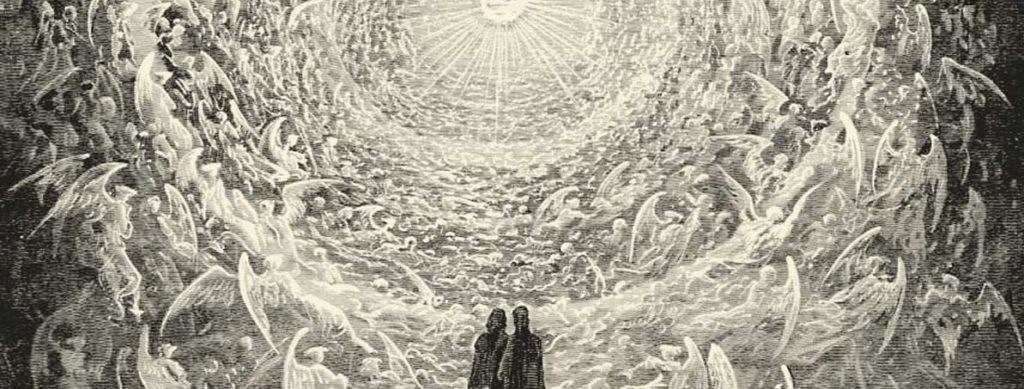
May 7, 2021

Jordan Flows through Barron Land
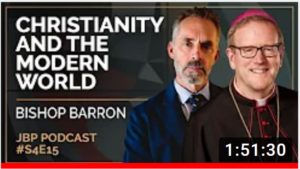 At the time of this writing, over a half million people have since watched the podcast discussion between Bishop Robert Barron and Jordan Peterson. Curious over the questions Peterson would ask as someone outside the fold, there were a number of missed opportunities for Peterson to be led where he needs to go. Peterson is evidently on a genuine search, and so he actually soft-pitches some thoughtful questions to the Bishop, but Peterson never gets challenged about why he needs to ask God for help to make an act of supernatural faith in the divinity of Jesus Christ.
At the time of this writing, over a half million people have since watched the podcast discussion between Bishop Robert Barron and Jordan Peterson. Curious over the questions Peterson would ask as someone outside the fold, there were a number of missed opportunities for Peterson to be led where he needs to go. Peterson is evidently on a genuine search, and so he actually soft-pitches some thoughtful questions to the Bishop, but Peterson never gets challenged about why he needs to ask God for help to make an act of supernatural faith in the divinity of Jesus Christ.
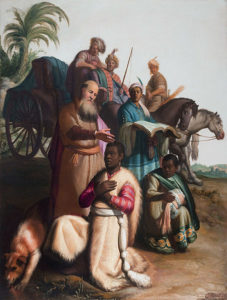 Could Peterson be a modern example of the Ethiopian man sitting upon his chariot reading Scripture, unknowingly waiting for (and needing) an Apostle to show up and open his eyes? (cf. Acts 8:28-29) God would bring St. Phillip to that man and secure his baptism. Since a bishop, as a successor of the Apostles, falls under the direct mandate from Christ to be a witness to the Resurrection, there is no telling what grace is being reserved for Peterson if one pointedly confronts him as to why he ought to believe in it.
Could Peterson be a modern example of the Ethiopian man sitting upon his chariot reading Scripture, unknowingly waiting for (and needing) an Apostle to show up and open his eyes? (cf. Acts 8:28-29) God would bring St. Phillip to that man and secure his baptism. Since a bishop, as a successor of the Apostles, falls under the direct mandate from Christ to be a witness to the Resurrection, there is no telling what grace is being reserved for Peterson if one pointedly confronts him as to why he ought to believe in it.
Early in the discussion, Barron talks about the overall crisis-level failure of the Catholic Church to attract and retain the youth in our modern day. Conscious of Christ’s command to evangelize, the Church at large seems ill-prepared or horribly inept to deal with the challenge, or perhaps too scared to use the tools at her disposal in the fear of losing a misplaced sense of “relevance.” (As Christ has demonstrated, though, numbers are not to be equated with relevance when it comes to the Faith; He would have turned the stones into bread if that was the case.)
To his credit, Barron is critical of this. He mentions how the subject of religion was not considered seriously when he attended Catholic school in the 1970’s, finding it ranked among physical education or other electives rather than the “more important” and compulsory subjects like science or math (a trend which has continued for decades). The teaching of the Faith was “dumbed down” in order to make it “relevant,” and time-honored ritual and practices, considered to be barriers to evangelization, were dropped so as to attract people.
The Bishop frankly admits that the attempt to “hug” people back into the Faith is a failure; riding the practice of the Faith on emotions is unsustainable, and so people must be led by compelling and passionate arguments and example to be convinced of the veracity of the Faith.
This is all intriguing to Peterson, who is quite sensitive and committed to helping people find true meaning for their lives, evident from the nearly four million subscribers to his channel; he is aware of the influence he has and the responsibility that carries, so his own journey is hardly an isolated one.

Peterson can arguably be included in the company of an Augustine or Newman as he publicly fights through and tries to make sense of the philosophical quandaries facing modern man. Hence why he informs himself and tackles the hot-button issues of socialism, the so-called “gender wars,” racism, freedom and responsibility, religion and suffering, among others. He is not afraid to respectfully call people out on their inconsistencies if they are willing and able to have a thoughtful conversation.
Acknowledging this great public hunger for serious conversation, Peterson invites critical discussion about religion because, as a competent psychologist, he understands how every human being is fundamentally religious, in that we are hard-wired to worship something and base our actions and morality off of that. This is not to say that religion is a subset of psychology – just the opposite. Psychology, within its proper limits, can be a useful tool in understanding how people may approach religion, because ultimately religion is necessary to answer (or attempt to adequately answer) the deepest of existential questions: Why am I here? Is my existence chanced or is it intentional? And if intentional, then what is its meaning? Why is there suffering?
This seems to be why Peterson focuses much on archetypes in his observations on Sacred Scripture and other writings both ancient and modern. Christ would be included among them, especially on account of His confrontation with evil. While Peterson conceives archetypes as products of an historical distillation process that, by the combined experience over thousands of years has edited the impurities or inconsistencies, yield an “ideal” we now have (something which is actually beyond the ability of flawed men), he rightfully asserts that commitment towards some ideal that the archetypes present, and making aspects of it manifest in the here and now, is what motivates people to act.
After all, Peterson does assert that a higher calling is necessary for the good of people and advancement of society. He understands well how this is the fatal flaw of any atheistic system, which always promises a materialistic utopia but never delivers. Draining all adventure out of life, all human drive (given our damaged nature) to improve for the good of oneself and one’s neighbor, atheism is at the root of the despair characteristic of a materialistic society. Hence he cites Dostoevsky’s observation that if people actually could have everything they needed with nothing higher to do, they would get destructive in order to create some adventure.
Peterson alludes to the fact that the Catholic Church is supposed to be able to respond to this, from what he understands the Church to be. He aptly criticizes that if the Church cannot hold numbers, perhaps people are not being challenged with a proper sense of adventure, perhaps they are not sufficiently being urged or convinced to take a higher calling, a “manifestation of an ideal,” seriously.
Interestingly, Barron casually poses the question as to what an archetype would look like if it took flesh, which is evidently the core teaching of Christianity regarding the Incarnation. That is the extremely important question which, if it be true and at the very least, demands a hypothetical answer. What does it mean for humanity or, better put, what meaning does it give humanity?
So Peterson will describe human history as an unbelievably magnificent drama. If the Catholic Church is in possession of the “story” (as he calls it) of the life, death, and Resurrection of Jesus Christ, then if this is not being sold, it is not being sold properly. Almost in the prose of St. Anselm, Peterson even goes as far to call it an adventure that “is greater than any adventure you can conceive,” and so he frustratingly poses the question as to whether lack of faith is responsible for sapping the lifeblood out of the story. What Peterson means in regard to faith or what it entails is unclear so, while Barron has to agree, that would have been a good question to press Peterson on.
For what the Church possesses is far more than the greatest story ever told or the greatest adventure ever conceived. Ironically, although the human attempt to “hug” people back into the Faith is a misguided and failed practice, we cannot get our arms around or love an ideal: only a Person. Only Someone and not something.
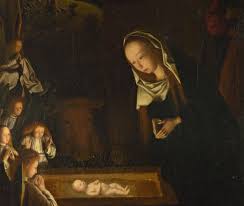 The Incarnation of the Son of God not only solves this limitation, but brings everything into the real. The Gospel then must be defended as an historical account: the “Jesus of history” and the “Christ of faith” are identical. God always must be a living Being who is always involved with the affairs of humanity.
The Incarnation of the Son of God not only solves this limitation, but brings everything into the real. The Gospel then must be defended as an historical account: the “Jesus of history” and the “Christ of faith” are identical. God always must be a living Being who is always involved with the affairs of humanity.
The Incarnation is what gives ultimate meaning and purpose to any life, for It applies to us all as individuals as it does to us as a race. So it is noteworthy that Peterson describes love as “a difficult and ugly thing,” because the Crucifixion proves that. The “adventure” of the Faith is what happens in the daily effort to encounter Christ in response to such love, challenging man to assess life and death from the perspective of the Cross and Resurrection, both historical realities as well as objects of faith possessing the credentials and credibility for belief.
The anemic state of affairs afflicting the Church that Peterson laments and Barron attempts to respond are given some perspective by Venerable Archbishop Fulton Sheen. Speaking in the 1940’s, he says:
We are at the end of a non-religious civilization, which regarded religion as an addendum to life, a pious extra, a morale-builder for the individual but of no social relevance, an ambulance that took care of the wrecks of the social order until science reached a point where there would be no more wrecks; which called on God only as a defender of national ideals, or as a silent partner, but who had nothing to say about how business should be run.
[…] The conflict of the future is between the absolute Who is God-man and the absolute which is the man-god; the God who became Man and the man who makes himself God; brothers in Christ and comrades in anti-Christ.
No doubt the great public hunger Peterson mentions for serious conversation is comparably matched by a hunger for the clarity and directness of a Fulton Sheen from the Church’s shepherds. May our leaders unashamedly assert the Church’s claim as the only revealed and authorized religion, that Christ’s message is not one among many to choose from, come what may, and then entrust to God how He decides to seed His fields as a result of such efforts. The fields are ripe for the harvest.
Intelligent discussion may lead to intelligent decision; strong supernatural faith breeds supernatural faith. That is how Christ arranged it when He commanded the Apostles to go and preach everything He taught, regardless if it appeared “relevant.”
Which is why it is of particular interest that the discussion concludes with a warning from Peterson. Because he sees the Church as having something of real value to offer (perhaps since he realizes the Church’s historical relationship to Western civilization), she has to be careful about becoming “too relevant.”
He then pitches how ritual should serve as a preventative for that, for ritual is supposed to be a place of safety and of peace, where a person should know what to expect, especially in the volatile times we find ourselves. That is important both for the sake of the unchanging Faith the ritual needs to express, and the psychological benefit for the person who partakes and believes. Barron mentioned the failure of “hugging” people back into the Faith; could the modern attempt to “hug” people into worship through casual and fluid ritual have the same result?
Peterson is owed a word of gratitude for this caution, an unknowing defense of the Church’s more ancient rites and piety.
Along with that, though, Jordan Peterson is also owed our prayers, joined with Bishop Barron’s, that his search for authentic truth and meaning brings him concretely in touch with the Person of Jesus Christ, the Resurrection and the Life, the Way and the Truth.
And maybe a couple million others to boot.
May 3, 2021

When Christ our Pasch was Sacrificed
by Fr. William Rock, FSSP.
“When Christ our Pasch was sacrificed” – From the Easter Vigil until the day before the Ascension, this phrase will recur again and again during Mass when the Easter Preface is prayed. These words cannot but draw us back to the Epistle read on Easter Sunday from St Paul’s First Letter to the Corinthians (5:7-8) which was as follows:
Brethren, purge out the old leaven, that you may be a new paste, as you are unleavened: for Christ our Pasch is sacrificed. Therefore let us feast, not with the old leaven, nor with the leaven of malice and wickedness, but with the unleavened bread of sincerity and truth.
In these lines, St. Paul draws on the imagery of two interconnected Jewish religious observances – that of the Passover and that of the Feast of Unleavened Bread.
The yearly observance of the Passover Feast commemorates the first Passover in Egypt where the Passover Lamb was sacrificed and its blood used to mark the doorframe. The Angel of Death, who killed the firstborn throughout the land of Egypt, passed over the houses thus marked and spared the firstborn therein (see Exodus 12:1-14, 21-30 et passim).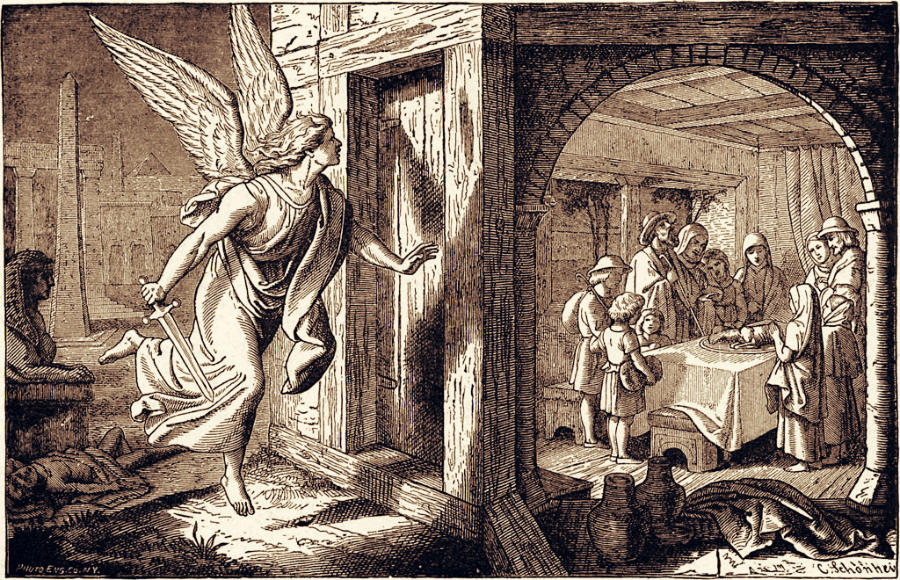
The Feast of Unleavened Bread recalls how the Hebrews “camest out of Egypt in fear” (Deut. 16:3) and with such urgency that they did not have time to allow the yeast to rise into order to bake leavened bread. The yearly celebration of the Passover ceremony would take place in the evening. The Feast of Unleavened Bread would start on the next day and last for seven days. During these seven days, nothing with leaven was eaten or even allowed in the house (see Exodus 12:15-18 et passim).
St. Paul, in his Epistle, identifies Christ with the Pasch or Passover Lamb. It is as if he were saying “our Paschal Lamb, Christ, was sacrificed for us, that as many as are washed with the Blood of His Passion in baptism and the other Sacraments may be defended in safety,” not from a physical death, as it was with the Hebrews in Egypt, but from a worse death, the death of sin and the eternal death of separation from God (Cornelius à Lapide’s The Great Biblical Commentary, 1 Corinthians 5). Following the first Passover, the Hebrews were released from bondage. In a similar way, “Christ has rescued those that have been so washed [in Baptism] from Pharaoh’s yoke, that is, from the yoke of the devil and of sin, and having set them perfectly free He has loaded them with all gifts and graces, and daily is adding more” (à Lapide).
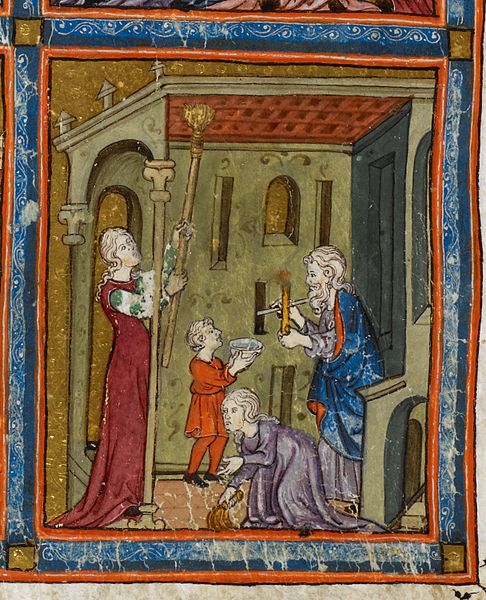
St. Paul then turns from the Passover to the Feast of Unleavened Bread as if to say “Christ, having been sacrificed for us as our Passover, has redeemed us, and has begun for us [our] feast of unleavened bread” (à Lapide). We are admonished to “feast, not with the old leaven, nor with the leaven of malice and wickedness, but with the unleavened bread of sincerity and truth.” The food of the Christian feast, symbolized by the unleavened bread, is simplicity, faithfulness, sincerity, truth, virtue, and holiness of life. We are to abstain, even more, we are to “purge out” from our lives, those things symbolized by the leavened bread – sin, malice, wickedness, and vice.
The historical feast of Unleavened Bread lasted for seven days. “Seven is a symbol of completeness, and therefore the seven days” associated with the Feast of Unleavened Bread “denote the whole of life here below” (à Lapide).
The lesson to be gathered from the Easter Epistle is this: as we have been redeemed by Christ sacrificing Himself for us and, by the power of which sacrifice, we are sanctified by Baptism and the other Sacraments, we should spend all of our lives purging out our vices and sins and striving to live a life of virtue and holiness.
But the life of virtue and holiness should not be a gloomy one. Gloominess does not befit one who is feasting.
The foundation of our joy is that Christ has truly risen from the dead – taking up the same Body which was placed in the Tomb. 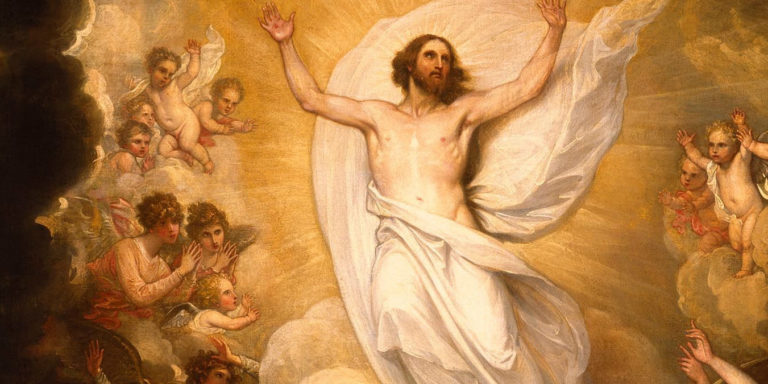
He has overcome our enemies of sin and death and lives now forever to assist us in achieving our own victories. Our King is a King of Victories.
How can this not give us confidence? How can this not give us joy? As the Liturgy of the Easter Octave constantly admonished us “this is the day which the Lord hath made: let us rejoice and be glad in it.”
Fr. William Rock, FSSP was ordained in the fall of 2019 and is currently in residence at Regina Caeli parish in Houston, TX.
April 28, 2021

Gatorade for the Gulag
 Aleksandr Solzhenitsyn’s The Gulag Achipelago is a gripping account of the veritable hell inflicted on the Russian populace through the rise and establishment of Soviet Communism, and presents much insight into mentalities in play in our own time and in our own country.
Aleksandr Solzhenitsyn’s The Gulag Achipelago is a gripping account of the veritable hell inflicted on the Russian populace through the rise and establishment of Soviet Communism, and presents much insight into mentalities in play in our own time and in our own country.
As the pages progress through the eyewitness accounts, a reader who strives to be civilized might find himself struggling with disbelief that what is being presented is true and accurate, that this is not some exaggeration, not some plot for Hollywood’s latest horror flick that would make Friday the Thirteenth seem appropriate for children, that it was even possible for humanity to sink to such lows and for such a prolonged period of time (and still is). As our stomachs turn, perhaps we realize how acclimated we have become to a diet of milquetoast and saccharine for far too long, and the optimism toted about humanity’s future – of course, once finally freed from the tyranny of Western Civilization – will prove to be dust in the wind against the breath of the Frankenstein our cancel culture is in the midst of creating.
For the believer, a thoughtful read of Gulag also presents a sobering challenge.
On one hand, it clearly demonstrates how possible it was for humanity to crucify Jesus Christ; on the other, not exactly knowing what to do with that, we may cope by trying to convince ourselves that everyone ultimately wants to be good.
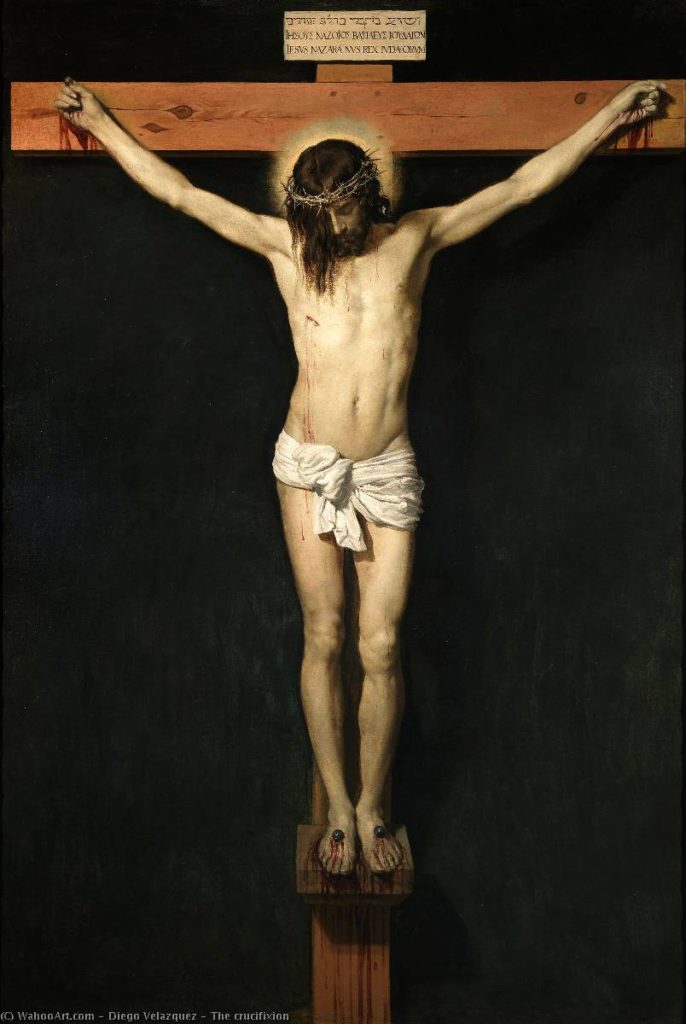 The Christian knows that Christ died for all – but not all are saved: one of those unpleasant and inconvenient truths that dot the pages of Sacred Scripture. Those who try to live the Commandments, difficult as it can be, can find it a mystery in regard to those who have no care to do so. We know the enemy that lurks within ourselves – weakness, blindness, malice, and concupiscence – and so we are careful when we point the finger knowing that, in the words of several saints, if it were not for the grace of God, there go I. But there are times when the enemy must be exposed.
The Christian knows that Christ died for all – but not all are saved: one of those unpleasant and inconvenient truths that dot the pages of Sacred Scripture. Those who try to live the Commandments, difficult as it can be, can find it a mystery in regard to those who have no care to do so. We know the enemy that lurks within ourselves – weakness, blindness, malice, and concupiscence – and so we are careful when we point the finger knowing that, in the words of several saints, if it were not for the grace of God, there go I. But there are times when the enemy must be exposed.
The real value of Gulag is not just in Solzhenitsyn’s lived experience that depicted the cruelties of such a regime (and this book was read by tens of thousands of “me too” survivors who validated every word of it). Gulag exposed what Communism and Socialism really are about, and presents a brilliant psychological analysis of what is at the core of both systems:
The thirst for power.
It is amazing what people will do to get it and secure it, and how it changes and twists those who first taste it and like it.
Communism and Socialism ultimately amount to be deadly Ponzi schemes where everyone who signs on ends up contributing to make those at the top more rich and powerful. Remember the pigs in Animal Farm?
The fact that neither system can be implemented peacefully, the fact that they have been and can only be established upon the corpses and shattered lives of millions, the fact that they require the silencing and cancellation of a majority and the rewriting of history, the fact that they promote the advancement of a few upon the exploitation and enslavement of many, reveal an atheistic and conscienceless ideology that has no concern for any eternal consequence. Solzhenitsyn observes:
Power is a poison well known for thousands of years. If only no one were ever to acquire material power over others! But to the human being who has faith in some force that holds dominion over all of us, and is therefore conscious of his own limitations, power is not necessarily fatal. For those, however, who are unaware of any higher sphere, it is a deadly poison. For them, there is no antidote. (Gulag, 4)
The flashpoint emerges when power is wedded to ideology, and this is when things get dangerous – and quickly. That is because ideology is not the same as truth.
In contradistinction, notice how careful Christ is to define power in terms of service; at the Last Supper, He washes the feet of His Apostles and commands that they follow His example (Jn. 13:13-15). He further forbids the use of force as a means to make converts (a slightly different approach from Islam’s methods).
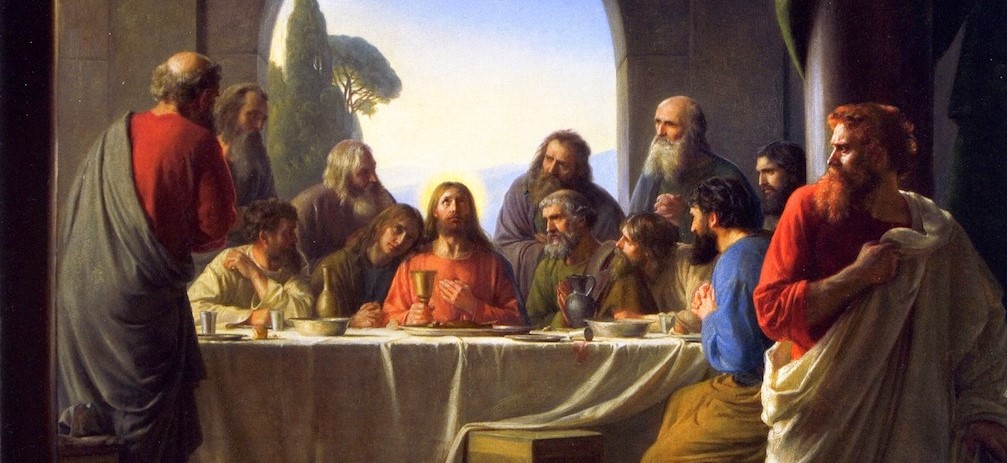
So whereas truth permits itself to be searched for and discovered, making self-correction and redemption a possibility, ideology imposes itself in a most rigorous and unbending fashion that demands absolute conformity. The acquisition of power sees to this. It is evident why free speech must be squelched and an iron curtain erected. The party line becomes sacrosanct, and fear is used to keep its elite followers beyond criticism and reproach. No one challenges the party line (which can change at the will of those in power) without consequences.
“Virtue signaling” in various and sundry forms is a sign of fidelity, and those who resist are first held as suspect, then as potential threats, and resolvedly as domestic terrorists, micro-aggressors, or hate-mongers. Solzhenitsyn continues:
Ideology – that is what gives evildoing its long-sought justification and gives the evildoer the necessary steadfastness and determination. That is the social theory which helps to make his acts seem good instead of bad in his own and others’ eyes, so that he won’t hear reproaches and curses but will receive praise and honors. That is how the agents of Inquisition fortified their wills: by invoking Christianity; the conquerors of foreign lands, by extolling the grandeur of their Motherland; the colonizers, by civilization; the Nazis, by race; and the Jacobins (early and late), by equality, brotherhood, and the happiness of future generations.
Thanks to ideology, the twentieth century was fated to experience evildoing on a scale calculated in the millions. This cannot be denied, passed over, or suppressed.
[…] Evidently evildoing has a threshold magnitude. Yes, a human being hesitates and bobs back and forth between good and evil all his life. He slips, falls back, clambers up, repents, things begin to darken again. But just so long as the threshold of evildoing is not crossed, the possibility of returning remains, and he himself is still within reach of our hope. But when, through the density of evil actions, the result either of their own extreme degree or of the absoluteness of his power, he suddenly crosses the threshold, he has left his humanity behind, and without, perhaps, the possibility of return. (Ibid.)
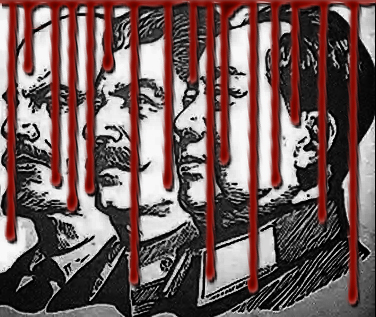 To increase power, those who subscribe to Socialist and Communist ideologies must exploit the natural diversity and inequalities present in humanity. Marx would incite class warfare to achieve his ends and establish a set of victims upon which to build a power base. But while he focused mostly on the economic, class simply is shorthand for classification, so it does not necessarily need to be economic. It can be whatever is most convenient for the matter at hand.
To increase power, those who subscribe to Socialist and Communist ideologies must exploit the natural diversity and inequalities present in humanity. Marx would incite class warfare to achieve his ends and establish a set of victims upon which to build a power base. But while he focused mostly on the economic, class simply is shorthand for classification, so it does not necessarily need to be economic. It can be whatever is most convenient for the matter at hand.
In a country like the United States where there is (or was) real possibility of graduation from one economic class to another, race could be used instead and historical injustices exploited to establish a “victim” class and an “oppressor” class. Sexual orientation can ride on its coattails and be built into the ideology of the party line, along with other things like environmentalism that are not categorically large enough (or even popular) to be exploited on their own. “Science” is elevated to a status of infallibility to support the agenda.
In the process, the party line gets to dictate which races are victims and which are not, who gets offended and what is considered offendable, another benefit of their power. But the existence of the victim class is necessary to maintain that power, so instead of being “liberated,” it is turned into a dependent class while being made to feel empowered under the guise of “fairness” or “equality.” Who gets cancelled and how history is rewritten must fall along these lines.
But how does it get this way?
While we cannot point to any one factor, if Solzhenitsyn’s observation above about crossing a threshold is correct, when a ruling class and the majority of its constituents have bought in deeply to the murderous abortion culture we live, the exploitation we see should not come as a surprise. How much justification goes on to validate it by so many! How much ink is spilled alongside the blood to defend it as a “right.” How much effort goes to prevent legislation that limits and illegalizes it, lest a massive and collective reckoning be demanded of the evil perpetrated for so long, and a surrender of the “freedoms” gained at the cost of the true right to life of the most vulnerable.
When the unborn are dehumanized for the gain of power, the already-born are dehumanized as well. No wonder contraception is the prelude to it.
Love without responsibility is no different from power without service. They both corrupt fast, carrying a sweet and addictive taste that masks the deadly poison within. Recall who coined the phrase I will not serve.
Hence why the Catholic must maintain a supernatural perspective of what is happening around us. There is no other way to adequately explain it, lest we be included in our Lord’s lament over finding little faith upon His return. It is no coincidence that everything Godly, Catholic, and decent is now considered oppressive and falls prey to an ideology which takes no prisoners.
 Wokeness is hardly about being awake; it poses as an angel of light, and well-serves as the vehicle to increase the power of a few who have long abandoned concern for eternity, to “reset” a world put on course by a Man on a Cross.
Wokeness is hardly about being awake; it poses as an angel of light, and well-serves as the vehicle to increase the power of a few who have long abandoned concern for eternity, to “reset” a world put on course by a Man on a Cross.
It is lamentable how little we hear from the Church leadership on these things, and for that they stand in more need our prayers. Perhaps we are witnessing the warnings of the Mother of God at Fatima playing out in our midst on account of that. Solzhenitsyn’s words are prophetic:
In keeping silent about evil, in burying it so deep within us that no sign of it appears on the surface, we are implanting it, and it will rise up a thousandfold in the future. When we neither punish nor reproach evildoers, we are not simply protecting their trivial old age, we are thereby ripping the foundations of justice from beneath new generations. It is for this reason, and not because of the “weakness of indoctrinational work,” that they grow up “indifferent.” Young people are acquiring the conviction that foul deeds are never punished on earth, that they always bring prosperity. It is going to be uncomfortable, horrible, to live in such a country! (Ibid.)
But our mission as Catholics does not change despite the circumstances, no matter what happens:
Be instant in season, out of season: reprove, entreat, rebuke in all patience and doctrine. For there shall be a time when they will not endure sound doctrine but, according to their own desires, they will heap to themselves teachers, having itching ears, and will indeed turn away their hearing from the truth, but will be turned unto fables. But be thou vigilant, labor in all things, do the work of an evangelist, fulfill thy ministry. Be sober.
For I am even now ready to be sacrificed: and the time of my dissolution is at hand. I have fought a good fight, I have finished my course, I have kept the faith. As to the rest, there is laid up for me a crown of justice which the Lord, the just Judge, will render to me in that day. And not only to me, but to them also that love His coming. (2 Tim 4:2-8)
How easily the indifferent with nothing to live for can be “woked up” by those who promise everything with no responsibility and no consequences, only to be enslaved by them in their own insatiable thirst for power.
How astonishingly different from the thirst Jesus Christ proclaimed from His Cross.
April 26, 2021








